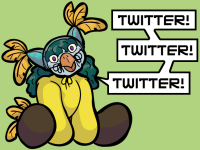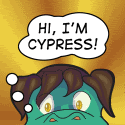What Everybody Ought to Know About Comic Buffers
 I should really know better than to respond to anything written by Scott Kurtz.
I should really know better than to respond to anything written by Scott Kurtz.For those who actually care about what the rest of the webcomic blogs (all four of them) are saying, Kurtz has a diatribe that doesn't really get to the heart of why cartoonists need buffers. Or rather, he talks about it but glosses over the reasons why, boiling them down to "Other people will think less of me".
I'll be the first to admit, having a buffer quickly becomes the best and the worst thing about your comic if you're not careful. It's good to have because it means you can relax and not have to worry about deadlines past a certain point. It's bad because if something about the comic ever gets received poorly, you're at a loss to do anything about it until your buffer runs out (especially if your plot continues on this hated portion for the next few strips)!
My main list of reasons for a buffer?
- Having a professional comic means I respect deadlines -- because I've already told my readers to come check for the comic then.
- Maintaining a constantly increasing archive / buffer makes the comic appear more "stable" and healthy.
- Working on the buffer NOW means I'm not working on it during the school year -- or at least not as hard as I would over the summer.
- I worry less about deadlines -- I have a hard enough time remembering what day to update the comic just to do the minor task of uploading it to the site, let alone if I had to work the week before to finish a comic in time!
- Even if vacations are working vacations, I can relax on the weekends -- which are when I'd have to be working like mad to get the next comic ready for an update if I didn't work at least that far in advance!
- Knowing what happens in future comics (and not just what I think will happen) gives me a sense of security -- because I'm following and reading along with my comic the same as everyone else, with the exception that I'm expected to figure out what happens next based off of these strips.
- Maintaining a buffer and reducing the stress to pop out a comic rapidly gives me more opportunity to experiment with new ideas -- not just for saleable materials but also for advertising and general growth of the comic.
I'm not saying Kurtz's list is "bad" or even ill-informed, but he's working from the perspective of a mature comic -- PvP isn't struggling for acceptance and awareness now, except against those who don't read comics. He doesn't have to work at advertising his comic to say that it's different from other comics, or struggle for legitimacy, or even deal with the fact that his comic appeals to a certain audience like it was somehow a bad thing. He has a whole different set of problems to worry about, not the least of which is that the time he could spend on advertising PvP is having to be spent just advertising webcomics in general because being a big fish in a small pond does you no good if the entire pond exists inside of a water cooler.
Penny Arcade can't afford a large buffer because they're building off of pop culture, but there's no reason they can't build up a few PA-oriented strips that they can intersperse with the gaming-focused comics so at least they have something to throw on the fire when the news is slow or that next idea just isn't coming. If your comic isn't oriented on popular culture at all, there's little reason to NOT build up a buffer. In my case, having an insane buffer makes sense, especially while I'm still in school (I'm currently freaking out right now because I'm still two strips shy of having enough for the semester!), and because I want to be able to produce more pages for the comic -- having a buffer allows me to do that without having to stress over deadlines, at least!
You're going to have your own reasons for keeping a buffer, depending on what kind of comic you're doing, how much effort it takes you, and what length of a buffer you feel comfortable with. Regardless of which path you go, keeping at least "the next update" in your buffer is just good sense; if nothing else, it's insurance.
Labels: backup, buffer, hint hint hint, oh dear god what have I gotten myself into, reputation, tips











